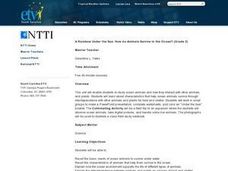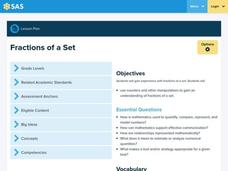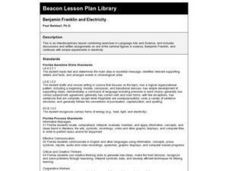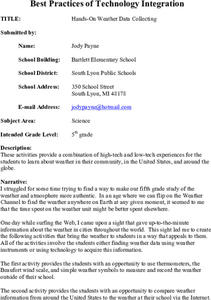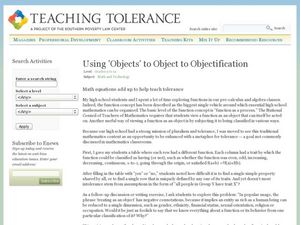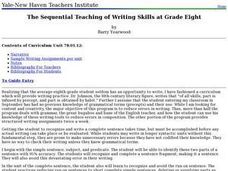Curated OER
A Rainbow Under the Sea: How do Animals Survive in the Ocean?
Second graders read books, watch videos, complete worksheets and participate in class discussions about ocean animals. They, in groups, design PowerPoint presentations on selected marine animals.
Curated OER
Figuring Elapsed Time
Students discover the concept of elapsed time. In this calculating time lesson, students utilize the Internet to complete record sheets based on the concept of elapsed time. Finally, the students answer questions on their own.
Curated OER
Changing Rocks
Learners shake a box containing Plaster of Paris "rocks", gravel, and sand, to measure the effects of erosion. They work individually during this exercise. This task assesses students' abilities to make simple observations, describe...
Curated OER
Peat Pots
Students place a peat pot in water to observe and calculate the rate of capillarity in a model of a soil. This task assesses students' abilities to make simple observations, collect, record, and represent data, use a data table to...
Curated OER
Modals of Polite Request
In this grammar worksheet, students are introduced to the modals of polite request and are given examples of each. There is an included exercise for students to complete.
Pennsylvania Department of Education
Fractions of a Set
Middle schoolers explore number sense by completing a number set worksheet. In this fractions lesson, students utilize pattern blocks as a visual reference to the fractions they practice identifying. Middle schoolers read the book...
Curated OER
Whose Voice Do I Hear?
Fifth graders examine the power of voice in writing by completing a story using words following a particular voice. They take simple nursery rhymes, then attempt to put their own voice to a revised version. An interesting lesson on writing!
Curated OER
Martin Luther King Jr.: A Fact Or Opinion Activity
Students discuss the difference between fact and opinion, then read a brief biography of Martin Luther King Jr. They complete the Martin Luther King Jr.: Fact or Opinion worksheet.
Curated OER
Benjamin Franklin and Electricity
Second graders study Benjamin Franklin and participate in simple experiments in electricity.
Curated OER
Hands-On Weather Data Collecting
Fifth graders use Internet sites to complete a study of weather and atmosphere. They compare weather data from cities around the world. They use thermometers, the Beaufort wind scale, and simple weather symbols to measure weather around...
Curated OER
Locomotor Dances
Learners explore and perform locomotor movements. With partners, they combine the locomotor movements into a simple dance. The partner identifies three movements they observed. Students may be grouped into dancers for a performance.
Curated OER
What's the Main Idea??
Students determine how to form a simple topic sentence in order to summarize a reading passage to increase comprehension. They apply the strategy to reading a passage from a textbook by writing a topic sentence for paragraphs about the...
Curated OER
Star Words
Students identify and categorize apostrophes. They create maps of the solar system and write simple sentences using apostrophes that describe each planet's characteristics.
Curated OER
How To Find the Area of a Square And Rectangle
Young scholars practice using the formula to calculate the area of a square or triangle. They participate in large group guided practice using simple area of squares problems then complete a series of problems calculating the area of...
Curated OER
Case Closed... Or Confusing?- a Quick Guide To the Three Cases
In this grammar worksheet, students read about grammar rules and then complete questions. Grammar rules covered are possessive, nominative, and objective case, linking verbs. invisible verbs, and pronoun use. This is an advanced grammar...
Curated OER
Agriculture Cares for the World
Students explore world geography by analyzing agriculture. In this dietary habits lesson, students discuss the role parents play in their children's diet and where the food comes from. Students write agricultural research paragraphs and...
Curated OER
Crustal Sinking
Students measure the rate of sinking of a test tube into a beaker of "glop", representing a model of the interaction between the Earth's crust and upper mantle. This task assesses students' abilities to make simple observations,...
Curated OER
Puddles and Soil
Students determine which of several soil samples (sand, soil, and slit) produces puddles, providing insight into the permeability of these different soils. This task assesses students' abilities to make simple observations, collect,...
Curated OER
Probing Under the Surface
Eighth graders use a measuring stick to determine the shape of the inside of the bottom of a box, then apply their knowledge to an additional situation. This task assesses students' abilities to make simple observations, collect and...
Curated OER
Using Objects to Object to Objectification
Learners use math functions in part to complete a metaphorical lesson on tolerance. In this math and tolerance lesson, students receive rows of functions and try to find a single simple shared property without success. Learners then...
Curated OER
Electromagnetism
Students construct a simple generator. In this electromagnetism lesson students divide into groups and perform the experiments on the given sheet.
Curated OER
Muppet Math Patterning
Young scholars participate in determining the completion of patterns and discovering which part of the pattern doesn?????™t belong.
Curated OER
The Sequential Teaching of Writing Skills at Grade Eight
Eighth graders are introduced to the techniques to write properly. As a class, they practice writing complete sentences and discover how to avoid run-on sentences. In groups, they review action and state of being verbs and practice...
Curated OER
Canada's Climate: Temperature and Rainfall Variations
Learners analyze data about various climates in Canada. In this data analysis and climate activity, students use Canada Year Book 1999 to complete a worksheet and make connections between precipitation and temperature in different climates.
